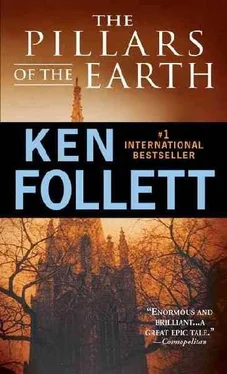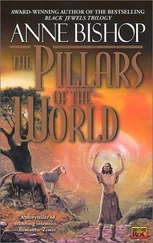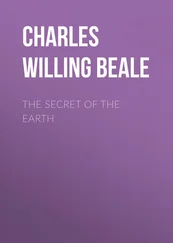
Ken Follett
The Pillars Of The Earth
To Marie-Claire , the apple of my eye
On the night of 25 November 1120 the White Ship set out for England and foundered off Barfleur with all hands save one… The vessel was the latest thing in marine transport, fitted with all the devices known to the shipbuilder of the time… The notoriety of this wreck is due to the very large number of distinguished persons on board; beside the king’s son and heir, there were two royal bastards, several earls and barons, and most of the royal household… its historical significance is that it left Henry without an obvious heir… its ultimate result was the disputed succession and the period of anarchy which followed Henry’s death.
– A. L. POOLE,
From Domesday Book to Magna Carta
1123
THE SMALL BOYS came early to the hanging.
It was still dark when the first three or four of them sidled out of the hovels, quiet as cats in their felt boots. A thin layer of fresh snow covered the little town like a new coat of paint, and theirs were the first footprints to blemish its perfect surface. They picked their way through the huddled wooden huts and along the streets of frozen mud to the silent marketplace, where the gallows stood waiting.
The boys despised everything their elders valued. They scorned beauty and mocked goodness. They would hoot with laughter at the sight of a cripple, and if they saw a wounded animal they would stone it to death. They boasted of injuries and wore their scars with pride, and they reserved their special admiration for mutilation: a boy with a finger missing could be their king. They loved violence; they would run miles to see bloodshed; and they never missed a hanging.
One of the boys piddled on the base of the scaffold. Another mounted the steps, put his thumbs to his throat and slumped, twisting his face into a grisly parody of strangulation: the others whooped in admiration, and two dogs came running into the marketplace, barking. A very young boy recklessly began to eat an apple, and one of the older ones punched his nose and took his apple. The young boy relieved his feelings by throwing a sharp stone at a dog, sending the animal howling home. Then there was nothing else to do, so they all squatted on the dry pavement in the porch of the big church, waiting for something to happen.
Candlelight flickered behind the shutters of the substantial wood and stone houses around the square, the homes of prosperous craftsmen and traders, as scullery maids and apprentice boys lit fires and heated water and made porridge. The color of the sky turned from black to gray. The townspeople came ducking out of their low doorways, swathed in heavy cloaks of coarse wool, and went shivering down to the river to fetch water.
Soon a group of young men, grooms and laborers and apprentices, swaggered into the marketplace. They turned the small boys out of the church porch with cuffs and kicks, then leaned against the carved stone arches, scratching themselves and spitting on the ground and talking with studied confidence about death by hanging. If he’s lucky, said one, his neck breaks as soon as he falls, a quick death, and painless; but if not he hangs there turning red, his mouth opening and shutting like a fish out of water, until he chokes to death; and another said that dying like that can take the time a man takes to walk a mile; and a third said it could be worse than that, he had seen one where by the time the man died his neck was a foot long.
The old women formed a group on the opposite side of the marketplace, as far as possible from the young men, who were liable to shout vulgar remarks at their grandmothers. They always woke up early, the old women, even though they no longer had babies and children to worry over; and they were the first to get their fires lit and their hearths swept. Their acknowledged leader, the muscular Widow Brewster, joined them, rolling a barrel of beer as easily as a child rolls a hoop. Before she could get the lid off there was a small crowd of customers waiting with jugs and buckets.
The sheriffs bailiff opened the main gate, admitting the peasants who lived in the suburb, in the lean-to houses against the town wall. Some brought eggs and milk and fresh butter to sell, some came to buy beer or bread, and some stood in the marketplace and waited for the hanging.
Every now and again people would cock their heads, like wary sparrows, and glance up at the castle on the hilltop above the town. They saw smoke rising steadily from the kitchen, and the occasional flare of a torch behind the arrow-slit windows of the stone keep. Then, at about the time the sun must have started to rise behind the thick gray cloud, the mighty wooden doors opened in the gatehouse and a small group came out. The sheriff was first, riding a fine black courser, followed by an ox cart carrying the bound prisoner. Behind the cart rode three men, and although their faces could not be seen at that distance, their clothes revealed that they were a knight, a priest and a monk. Two men-at-arms brought up the rear of the procession.
They had all been at the shire court, held in the nave of the church, the day before. The priest had caught the thief red-handed; the monk had identified the silver chalice as belonging to the monastery; the knight was the thief’s lord, and had identified him as a runaway; and the sheriff had condemned him to death.
While they came slowly down the hill, the rest of the town gathered around the gallows. Among the last to arrive were the leading citizens: the butcher, the baker, two leather tanners, two smiths, the cutler and the fletcher, all with their wives.
The mood of the crowd was odd. Normally they enjoyed a hanging. The prisoner was usually a thief, and they hated thieves with the passion of people whose possessions are hard-earned. But this thief was different. Nobody knew who he was or where he came from. He had not stolen from them, but from a monastery twenty miles away. And he had stolen a jeweled chalice, something whose value was so great that it would be virtually impossible to sell-which was not like stealing a ham or a new knife or a good belt, the loss of which would hurt someone. They could not hate a man for a crime so pointless. There were a few jeers and catcalls as the prisoner entered the marketplace, but the abuse was half-hearted, and only the small boys mocked him with any enthusiasm.
Most of the townspeople had not been in court, for court days were not holidays and they all had to make a living, so this was the first time they had seen the thief. He was quite young, somewhere between twenty and thirty years of age, and of normal height and build, but otherwise his appearance was strange. His skin was as white as the snow on the roofs, he had protuberant eyes of startling bright green, and his hair was the color of a peeled carrot. The maids thought he was ugly; the old women felt sorry for him; and the small boys laughed until they fell down.
The sheriff was a familiar figure, but the other three men who had sealed the thief’s doom were strangers. The knight, a fleshy man with yellow hair, was clearly a person of some importance, for he rode a war-horse, a huge beast that cost as much as a carpenter earned in ten years. The monk was much older, perhaps fifty or more, a tall, thin man who sat slumped in his saddle as if life were a wearisome burden to him. Most striking was the priest, a young man with a sharp nose and lank black hair, wearing black robes and riding a chestnut stallion. He had an alert, dangerous look, like a black cat that could smell a nest of baby mice.
Читать дальше













